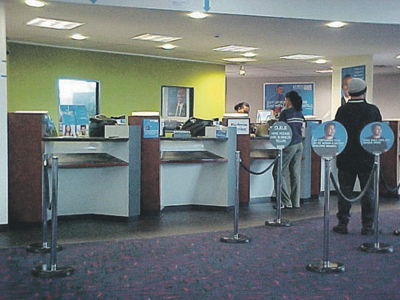
You are at the head office of the telephone company, asking the receptionist where you can pay your bill. He directs you to the cashier's counter. There you join a long queue.
A: Is this the last day for paying my phone bill?
B: Yes, ma'am. Your'e just in time. We're closing in ten minutes. Your bill is due today. If you pay now, there won't be a penalty.
A: Good, I'll pay now.
B: Is it cash or cheque?
A: Cash, please.
B: Thank you very much. Here's your change and stamped receipt.
A: Must I come here to pay my bill every month?
B: No, you actually have many choices. For example, you can either send in a cheque for your bill by mail, or you can pay your bill at the bank for a small fee.
A: I hate writing cheques. I'd much rather do it through the bank. It's more convenient.
你在電話公司的辦事處內,問接待員在那裏繳費,他告訴妳到收銀處(Cashier's)排隊繳費。
甲:我的電話費是否今天到期?
乙:是呀,太太。妳剛好及時趕到,十分鐘後我們便下班了。妳的電話今天到期。如果妳現在交費,便不用交罰款。
甲:好,我現在便交。
乙:妳用現金還是支票呢?
甲:現金,謝謝!
乙:謝謝!這是找回給妳的零錢和已蓋印的收據。
甲:我是否需要每月到這裏交費呢?
乙:不是,其實你有很多選擇,例如你可以郵寄支票,或者到銀行交費,但你要繳交些微手續費。
甲:我不喜歡簽支票,我寧願透過銀行辦理,那樣會比較方便。
Language Notes 語文註解:
(1) Bill——賬單。
(2) Ma'am=Madam—女士的尊稱,可指太太或小姐。
(3) In Time—及時。
(4) Closing——下班。
(5) Penalty——罰款。
(6) Change——找回的零錢。
(7) Receipt——收據。
(8) Mail——郵遞。
(9) I'd rather=I would rather——寧願。例:I'd rather pay by cheque than by cash. 我寧願用支票付款,不用現金。






